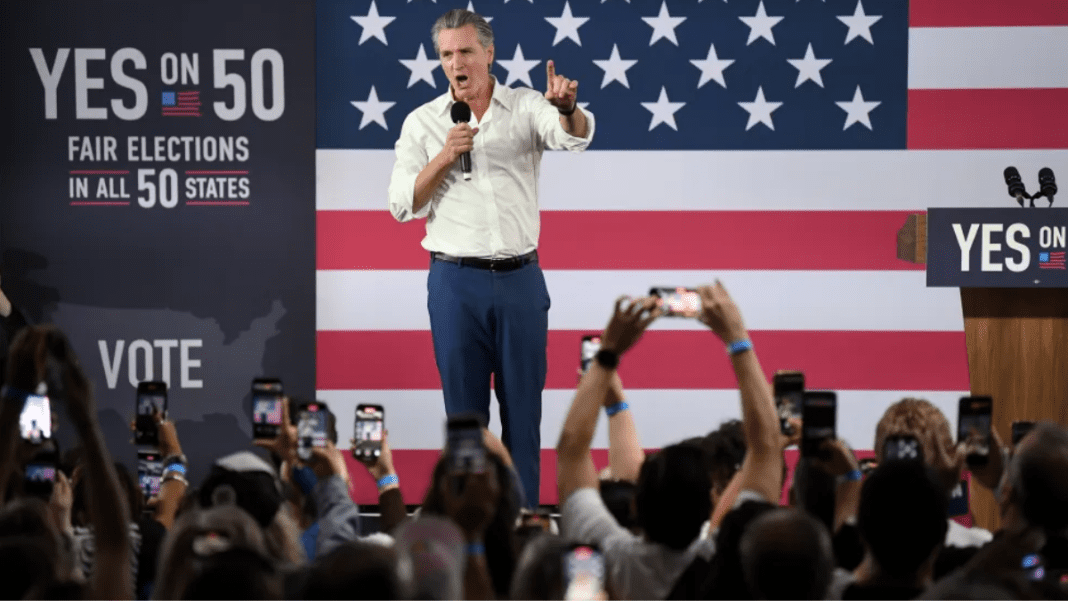California Governor Gavin Newsom has secured a major political victory with the passage of Proposition 50, a ballot measure that allows the state legislature to redraw congressional districts. The move is expected to give Democrats as many as five additional seats in the U.S. House of Representatives.
The measure, which suspends the state’s independent redistricting commission, was presented as a direct response to Republican-led gerrymandering efforts in Texas, backed by President Donald Trump. Earlier this year, Texas Republicans redrew congressional maps at Trump’s urging, solidifying their advantage. In protest, a group of Texas Democrats fled the state to block the vote, hoping to inspire national action.
Newsom answered that call. Working with Democratic leaders, he fast-tracked Proposition 50 through California’s legislature and onto the ballot. The victory marks a remarkable turnaround for an initiative that did not exist just a few months ago.
At a Sacramento rally before the vote, the governor declared, “They poked the bear, and the bear is poking back.” His aggressive approach has drawn both praise and criticism, but the result is clear: California has now joined the redistricting fight with a decisive show of force.
National Momentum and Political Impact
The passage of Proposition 50 has thrust Newsom into the national spotlight. Supporters see the measure as a way to counterbalance Republican-drawn maps in other states, while opponents warn it undermines California’s reputation for independent, nonpartisan mapmaking.
The “Yes on 50” campaign received millions in small-dollar donations, much of it from outside California, and drew endorsements from Barack Obama and Alexandria Ocasio-Cortez. Political analyst Bob Shrum of the University of Southern California said the victory is more than just a policy win — it highlights Newsom’s willingness to take political risks when others hesitate.
According to Dave Wasserman of the Cook Political Report, the new congressional lines could improve Democrats’ chances of retaking the House by as much as 10 to 15 percent. That shift could prove decisive in a closely divided chamber.
Newsom’s victory also amplifies his standing as one of the most visible Democratic figures in the country. Over recent months, he has positioned himself as a leading critic of President Trump’s administration. Their feud deepened after Trump sent National Guard troops to Los Angeles during immigration protests, despite Newsom’s objections.
Through a blend of traditional campaigning and modern outreach, the governor has expanded his audience well beyond California. He has appeared on popular podcasts like All the Smoke with Matt Barnes and Stephen Jackson, and even joined Twitch streamer ConnorEatsPants for an online gaming session, reaching younger voters through digital platforms.
Political battle ignites — Obama backs Newsom in war over Trump’s Prop 50 redistricting
A Win That Redefines Political Ambitions
The Prop 50 win comes as Newsom’s national ambitions are becoming increasingly clear. In a recent interview, he acknowledged that he would consider a 2028 presidential run, joining other potential Democratic contenders such as former Vice President Kamala Harris, Illinois Governor JB Pritzker, Pennsylvania Governor Josh Shapiro, and former Transportation Secretary Pete Buttigieg.
Political consultant Mike Madrid described the redistricting victory as a turning point, saying it repositions Newsom at “the tip of the spear” in the Democratic resistance against Trump. With this achievement, the term-limited governor now commands renewed influence in national politics.
Critics, however, remain divided. Republicans accuse him of abandoning California’s tradition of fairness in redistricting, while some progressives argue that his moderate stances on homelessness, immigration, and social policy show political calculation ahead of a future White House bid. Still, the success of Prop 50 has united Democrats around him at a time when the party has struggled to find a strong, unifying figure.
As Newsom told supporters after the victory was announced, California’s message was simple: “We are done with being treated like this.” The crowd erupted in cheers, a moment that not only marked a win for his state but also a defining milestone in his rise as a national Democratic leader.





